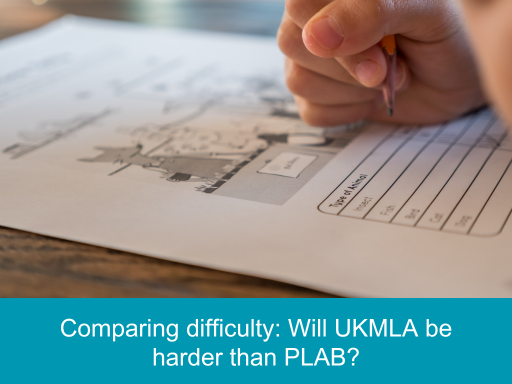The United Kingdom Medical Licensing Assessment (UKMLA) and the Professional and Linguistic Assessments Board (PLAB)
The United Kingdom Medical Licensing Assessment (UKMLA) and the
Professional and Linguistic Assessments Board (PLAB) are two distinct
assessment systems that play vital roles in ensuring the competence of medical
graduates, particularly international medical graduates from other countries seeking
to practice medicine in the UK. Comparing these assessments reveals critical
differences and similarities.
The UKMLA, introduced as a comprehensive evaluation system, assesses medical
graduates on a broad spectrum of competencies. It encompasses clinical skills,
medical knowledge, communication skills, and professional judgment. The
difficulty level is often considered high, reflecting the rigorous standards of
the UK healthcare system. Success in both UKMLA Part 1 (theoretical
knowledge) and Part 2 (clinical skills and communication) is mandatory for medical licensing.
In contrast, the PLAB exam, a longstanding pathway for international medical
graduates, primarily focuses on assessing clinical knowledge and English
language proficiency. While it evaluates medical knowledge and communication
skills to some extent, its primary emphasis is clinical aptitude. The PLAB is
typically perceived as more approachable in terms of difficulty compared to the
UKMLA.
Preparation strategies for these assessments differ significantly. As the UKMLA
is more comprehensive, candidates must invest more time honing their clinical
skills, communication abilities, and professional judgment. Comprehensive
medical education and training are critical.
On the other hand, PLAB candidates may concentrate more on clinical knowledge,
although solid communication skills are still essential. The format of these
assessments also differs, with the UKMLA utilizing Objective Structured
Clinical Examinations (OSCEs) for clinical skills assessment. At the same time,
PLAB incorporates multiple-choice questions and Objective Structured English
Examinations (OSEEs) for communication skills.
Overall, the UKMLA represents a shift towards a more standardized and
comprehensive evaluation process for all medical graduates, domestic and
international. While it is more challenging, it aligns better with the
expectations and demands of the UK healthcare system. PLAB, while less
comprehensive, remains a viable pathway for international medical graduates,
emphasizing clinical knowledge and language proficiency. Ultimately, the choice
between the two assessments depends on individual career goals and
preparedness for the demands of UK medical practice.
Tags: UKMLA; PLAB; Medical Licensing;
Assessment Comparison; Difficulty Level; Clinical Skills; Medical Knowledge;
Communication Skills; ProfessionalJudgment; Preparation Strategies; Medical
Graduates; Medical Education; Assessment Format; Standardization; Comprehensive
Evaluation




